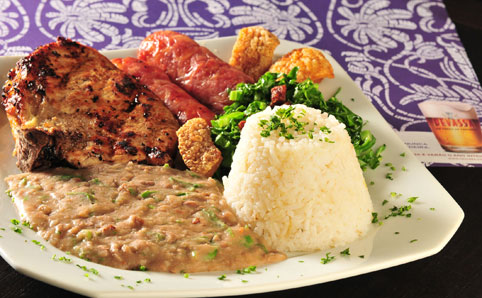
Roast beef on Sundays; fish and chips Fridays; spicy kebabs on a Saturday night. There’s nothing like a bit of repetition to inject some predictability into life, but few places take it to the lengths it reaches in street corner lanchonetes, workaday restaurants and botecos across São Paulo. Here, there’s a dish for every day of the week, and they’re crowned, arguably, by the rich savoury goodness of the national passion, the feijoada.
Saturdays and Wednesdays are the days pots filled with beans, sausages, and pork offal bubble for hours the length and breadth of the land before being served up to gaggles of family and friends, garnished with orange slices and piles of bright green kale. ‘I’m having some friends over,’ sang Chico Buarque in his song ‘Feijoada Completa’. ‘They’ll arrive with a hunger words can’t describe, With a thirst on from the day before yesterday. So bring out enough ice cold beers for a battalion, and let’s get some water on those beans.’
Mondays are a different story, with virado à paulista, a comforting plate of rehashed beans with pork and rice, on the cards; Tuesdays spell tripe; and Thursdays, it’s oxtail – rabada. There’s fish on Fridays, natch, in this most Catholic of countries – which leaves Chico’s feijoada get-together for Saturdays and Wednesdays, and pizza or pasta on Sundays.
It’s the same story in thousands of restaurants across São Paulo. Known as pratos feitos or ‘PFs’, these basic meals are said to have originated with the 16th-century tropeiros – animal herders who travelled across the country and needed quick and cheap sustenance on the move. In São Paulo at the turn of the 20th century, restaurants and botecos started serving the cheap midday meals to cater to the city’s booming workforce – country folk who flooded into the city to work, and could no longer make it home for lunch. Over the years, pratos feitos have evolved, and today São Paulo’s day-by-day menu reads like an anthropology of food thanks to the city’s complex web of cultures and cuisines.
Some are simple to understand – fish on Fridays owes its ubiquity to an ecclesiastical law made by Pope Nicholas I in the 9th century, as a day of abstinence from meat in memory of Christ’s suffering and dying on that day. But why feijoada on Saturdays? And virado à paulista of a Monday? And what’s a virado anyway?
Folklore expert Lilian Vogel has the answers. As the director of the Comissão Paulista de Folclore, she has researched the tradition of the virado – a start-the-week fill-me-up. ‘It’s about eating whatever’s left over from the weekend,’ she says. ‘There might be pumpkin, eggs, beans, some meat or some chicken, so people make a viradinho to use it all up. You cook the leftovers up into a broth which you then virar [turn upside-down] by thickening it with manioc or corn flour.’
‘In São Paulo, it’s served with couve [kale], pork, sausage, fried bananas and fried egg, and so it became Virado à Paulista. But where I’m from,’ she goes on, ‘in Atibaia, in São Paulo state, we plant a lot of peas, and so our virado is pea-based. The flour is different too – we use white corn flour,’ she says.
The origins of Tuesday’s dobradinha, made from tripe with white beans, bacon and sausage, and Thursday’s rabada (oxtail), are less clear, although pasta and pizza on Sundays are an obvious nod to the city’s Italian roots. Indeed, if you’re looking to eat on out in São Paulo on a Sunday night, you’ll be hard pressed to find many restaurants open at all except pizzarias, which, without a doubt, do their best business of the week that night.
And as for feijoada, Vogel proposes a plausible theory: ‘You have to soak the meat to get rid of the salt, which takes time. So it makes sense that you should do these preparations at the beginning of the week, ready for Wednesday, and then again in time for Saturday.’ The only other reminder you’ll need is the one about getting the beers on ice. Cheers, Chico.



